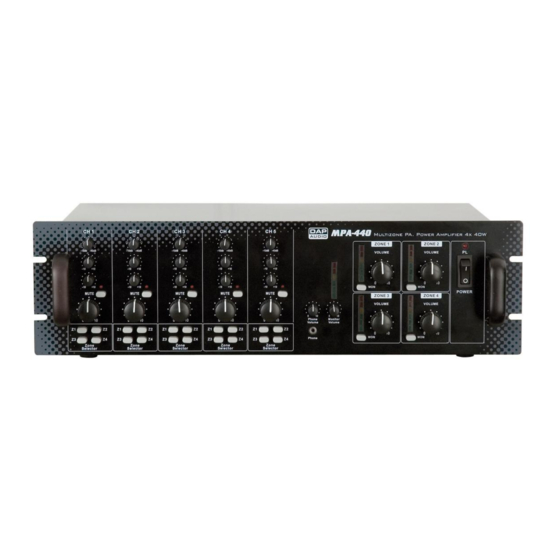DAPAudio MPA-440 Panduan Produk - Halaman 9
Jelajahi secara online atau unduh pdf Panduan Produk untuk Penguat DAPAudio MPA-440. DAPAudio MPA-440 14 halaman. Professional multi zone public adress amplifier

Operation
Installation
Remove all packing materials from the IPS-MPA440. Check that all foam and plastic padding is removed.
Secure the equipment into a 19" rack. Connect all cables.
Connecting Power / Circuit Size Requirements.
The actual current draw, the amplifier demands from the AC mains, depends on many factors (its load,
output level or the crest factor of its program material).
The power requirement is rated under typical music conditions, with both channels driven so those peaks
are just at the clipping point.
Make sure the mains voltage is correct and is the same as printed on the rear of the amplifier. Damage
caused by connecting the amplifier to improper AC voltage is not covered by any warranty. Unless
otherwise specified when ordered. DAP audio amplifiers shipped to customers are configured as follows:
North America 120VAC/60Hz
Europe 230VAC/50Hz
Asia 220VAC /50Hz/60Hz
Australia 240VAC/50Hz
South America 120VAC/60Hz or 220VAC/50Hz
Japan 100VAC/50Hz
NOTE: Always turn off and disconnect the amplifier from mains voltage before making audio
connections. Also, as an extra precaution, have the attenuators turned down during
power-up.
Connecting Inputs.
Use the XLR input connectors on the rear to supply audio signals to your DAP Audio MPA- Series amplifier.
The connectors accept balanced and unbalanced audio connections. (The MPA- Series amplifiers are
configured standard with "Pin 2 hot" on XLR inputs. The Link connector can be used to loop the audio
Input to another amplifier Input. For more Information, see the section on Connection cables page 10.
Connecting Outputs.
Speakers are connected using terminal connectors. See the examples below and following page.
Low impedance outputs
You can use as many speakers as you want as long as the total impedance matches the amplifiers
output.
Example 1: using the 4Ω output with two 8Ω speakers.
Example 2: using the 4Ω output with four 4Ω speakers
7
